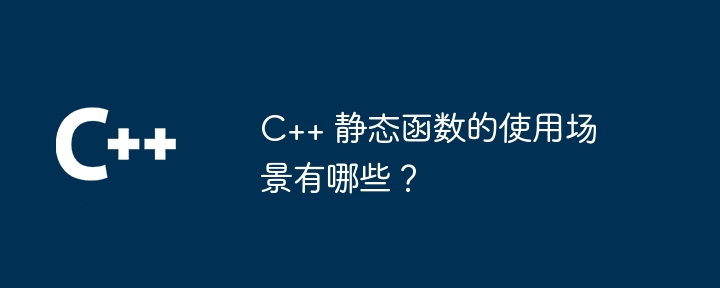
Static functions are used in C for class-independent operations or utility functions, including: Utility functions: Provide independent utility functions, such as string manipulation or mathematical operations. Factory method: Creates a new instance of a class and returns a pointer or reference. Constant functions: access constant data and ensure that class state remains unchanged. Enumeration type function: Get the name or description of the enumeration value.

Usage scenarios of C static functions
Static functions are a special type of function in C and do not access classes Non-static member data or functions. They are typically used to handle class-independent operations or provide utility functionality.
Usage scenarios:
class Utility {
public:
static int max(int a, int b) {
return a > b ? a : b;
}
};
int main() {
int result = Utility::max(10, 20);
std::cout << "Maximum: " << result << std::endl;
return 0;
}class Shape {
public:
static Shape* createCircle(float radius) {
return new Circle(radius);
}
};
int main() {
Shape* circle = Shape::createCircle(5.0f);
std::cout << "Area of circle: " << circle->getArea() << std::endl;
return 0;
}class Person {
public:
static const char* getGenderString(Gender gender) {
switch (gender) {
case Male:
return "Male";
case Female:
return "Female";
}
return "Unknown";
}
};
int main() {
for (Gender gender : {Male, Female}) {
std::cout << GenderString(gender) << "; ";
}
std::cout << std::endl;
return 0;
}enum class Color {
Red,
Green,
Blue
};
class ColorUtil {
public:
static std::string getColorName(Color color) {
switch (color) {
case Color::Red:
return "Red";
case Color::Green:
return "Green";
case Color::Blue:
return "Blue";
}
return "Unknown";
}
};
int main() {
Color color = Color::Green;
std::cout << "Color name: " << ColorUtil::getColorName(color) << std::endl;
return 0;
}The above is the detailed content of What are the usage scenarios of C++ static functions?. For more information, please follow other related articles on the PHP Chinese website!
 What are the differences between c++ and c language
What are the differences between c++ and c language
 Recommended learning order for c++ and python
Recommended learning order for c++ and python
 Cost-effectiveness analysis of learning python and c++
Cost-effectiveness analysis of learning python and c++
 Is c language the same as c++?
Is c language the same as c++?
 Which is better to learn first, c language or c++?
Which is better to learn first, c language or c++?
 The difference and connection between c language and c++
The difference and connection between c language and c++
 C++ software Chinese change tutorial
C++ software Chinese change tutorial
 Cost-effectiveness analysis of learning python, java and c++
Cost-effectiveness analysis of learning python, java and c++




